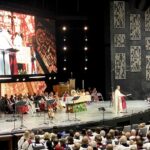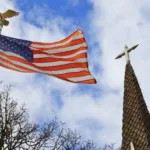Panelists in a National Council of Churches (NCC) conversation held on December 2, titled “The Dilemma of Americans: Where is Christ?”, shared many critiques of both America’s founding institutions and the current and historical state of Christianity in the country. Despite the conversation’s title, panelists instead focused on the topics of Christian nationalism and race relations in America.
Assertions made by participants in the discussion included linking white nationalism to Christian nationalism, comparing America’s evangelicals to evangelicals in 1930s Germany, and calling the church complicit in racism and white supremacy.
The panel, part of an ongoing “Faith & Fire” conversation series titled “Chaos or Community: Courageous Conversations During Chaos,” was moderated by Rev. Dr. Leslie Copeland-Tune, NCC chief operating officer. “Now we’re at this place where it’s almost toxic, if I can use that word,” stated Copeland-Tune early in the conversation regarding the pervasive idea of America as a Christian nation.
“There has been a snowball effect [of America being considered a Christian nation] that has really fed into the idea of white nationalism, of Christian nationalism,” continued Copeland-Tune. Panelist Amanda Tyler, executive director of the Baptist Joint Committee, agreed with and expanded on this notion.
“This ideology is really pervasive. It’s long-standing. It dates back at least two centuries,” Tyler stated. “Christian nationalism really does rely heavily on this mythical founding of the United States as a Christian nation.”
Panelists not only attributed many of America’s current ills and polarization to Christianity and Christian nationalism, but also implicated the church and Christianity in systemic racism in America, a topic which, of course, has come to the forefront of civic dialogue in 2020.
“We’re thinking about a country that was founded on principles of racism,” Tyler stated at one point in the conversation.
“Just like Christian nationalism is so pervasive and can’t be separated from the American experience, neither can racism,” Tyler continued. She furthermore promoted the grassroots campaign “Christians Against Christian Nationalism,” which Tyler leads in her role as executive director of the Baptist Joint Committee for Religious Liberty.
According to the organization’s website, Christian nationalism “seeks to merge Christian and American identities, distorting both the Christian faith and America’s constitutional democracy. Christian nationalism demands Christianity be privileged by the State and implies that to be a good American, one must be Christian.”
Panelist Rev. Dexter Udell Nutall, senior pastor at New Bethel Baptist Church in Washington, DC, emphasized the complicity of the church in America in racism and white supremacy. “The Founding Fathers were complicit in what it is that we are experiencing today, and I think that it is important that that be acknowledged and appreciated, and as Christians, that we repent,” Nutall asserted.
The moderator and panelists took up “us” vs “them” rhetoric, often using the “other,” but never defining concretely who belongs to the “other” category. (Although, one can presume they were referring to Christians with different political affiliations than themselves.) “Their Jesus just doesn’t reflect the Jesus that we know in our sacred texts,” stated moderator Copeland-Tune, without defining the “they.”
Rev. Dr. Rob Schenck, president and CEO of the Dietrich Bonhoeffer Institute, however, was more restrained when referring to those Christians with opposing views. “All of us just have to be careful about how we characterize the ‘other,’” said Schenck.
Schenck, however, did not hesitate to criticize American Christians, especially those in his own community, as an evangelical. “I look back and see the error that the evangelical Church in Germany committed [in the 1920s-30s] is the same error that my community is committing today,” stated Schenck. “And that is to confuse the political with the religious or the spiritual.”
Though the conversation’s official title suggested it would be centered on Christ, He was rarely mentioned in the talk. One notable exception came when, in assessing how Christians of all political affiliations can move forward from the current place of deep division, Schenck asserted that “the cure is to return to the central tenet of our faith — Jesus.”
As Americans approach the new year still confronted by our deep political and cultural divisions, one can only hope that more American Christians follow Schenck’s suggestion. We must let our commonalities as Christians unite us, rather than letting our political differences divide us further.






Comment by David on December 11, 2020 at 7:57 pm
The iconic image of early America is the Pilgrim on his way to services carrying a bible and a musket. The reality was not quite that simple. A 1750 visitor to Pennsylvania mentioned:
“Besides, there are many hundreds of adult persons who have not been and do not even wish to be baptized. There are many who think nothing of the sacraments and the Holy Bible, nor even of God and his word. Many do not even believe that there is a true God and devil, a heaven and a hell, salvation and damnation, a resurrection of the dead, a judgment and an eternal life; they believe that all one can see is natural. For in Pennsylvania every one may not only believe what he will, but he may even say it freely and openly.”
The high point of American religiosity was likely around 1890 judging by the number of churches constructed. The social disillusionment following WWI gave rise to the Roaring Twenties when church membership suffered.
Comment by Donald on December 12, 2020 at 7:29 am
It doesn’t surprise me that the sycophants on the National Council of Churches would demonstrate their ignorance on the German evangelicals. The Theological Declaration of Barmen explicitly rejects a conflation of Church and State (TDB – 8.16 – 8.18 and 8.22 – 8.24). I leave it to those who read my comment to take it upon themselves to do this research.
The answer is NOT a “Jesus Only” faith. The earliest disciples realized they had to come to some understanding of how their national identity and their spiritual faith could remain in relationships; thus Peter’s dictum of “Fear God. Honor the Emperor” (2 Peter 2:17)
Comment by Will on December 12, 2020 at 4:35 pm
I was baptized as a Presbyterian but left the church a few years after the merger into PCUSA in 1983. The National Council of Churches was far left even then. Their publication usually featured an article by someone who was undoubtedly an avowed Marxist. I don’t remember the writer’s name but he was the biggest reason I left the church. PCUSA and NCC are two organizations that I want no part of.
Comment by David Funnell on December 13, 2020 at 2:04 pm
Kennedy Lee finalized her poignant essay saying “…let our commonalities as Christians unite us, rather than letting our political differences divide us.”
There is quite definitely a background picture, that I feel sure she may have (with more space to write) have cast in the mold of tares among the wheat: political differences certainly have their origins in the foundations of faith, actions like words springing from the heart.
Comment by Don Bryant on December 14, 2020 at 4:24 am
This is a very weak analysis of the complexities involved in weaving Christian commitments with the flourishing of one’s own country. “The cure is to return to the central tenet of our faith — Jesus.” The cure might be, instead, a la Kuyper, to apply that central tenet wisely to culture/nation with courage and indefatigable energy. You can’t get out of that responsibility. And the Left will cry foul every time, as they did in Poland, Hungary, etc. It was the church that brought down the godless political order. The “we must be careful of Hitlerian nationalism” is simply a meme in this context, used to keep the church quiet. This article should not have let that stand without a challenge.
Comment by David on December 14, 2020 at 6:21 am
Sadly, Poland and Hungary are no longer shining examples of democracy and have fallen into a strongman type pattern. I strongly suspect Russia as having promoted this as they seek to reunite with territories lost in the fall of the Soviet Union.
Comment by Michael Murphy on December 14, 2020 at 9:15 am
Wow, my experience as a Christian in America is nothing like the NCC outlined at all! Calling the US a Christian nation really ignores the realities all around us . I personally know more people that aren’t Christian that are, and I’ve been a practicing Christian for 38 years. I’m failing to see the point they are trying to make here. Faith and Christianity have nothing to do with American politics. I have Christian friends on both sides of the aisle, and we all agree that Jesus is our common denominator.
It seems to me that the NCC would rather focus on politics than on Jesus. Sad, really.
Comment by Mark Siegman on December 14, 2020 at 9:36 am
Disturbing, but not at all surprising that this discussion devolved into panelists ascribing most social ills in America to Christianity, categorizing Christianity itself as “Toxic”. Noteworthy that “Christ” (and I assume “Jesus”) were barely mentioned.
As society becomes more secular, why would anybody expect a “seeker” (apologize to any who took offense at my using that term, which may be too evangelical and disgusting) to explore Christianity? Leadership from NCC (and sadly, most historic “Mainline” denominations) is indistinguishable from a Progressive Political Action Committee. This epitomizes “The Suicide of Liberal Christianity”.
Comment by Adler Pfingsten on December 14, 2020 at 9:51 pm
I spent a mere 5 seconds in 70AD Jerusalem but it was enough time to lean why Christianity has been wrong for almost 2000 years and why Judaism has never gotten it quite right. I published ‘Not Peace but the Sword; Jefferson Survives’ in September and since then published onefaith-onevoice.org / commonsensecession.org and judeochristiannation.org
All three include the Convergence Matrix which is waiting for a probabilities mathematician bold enough to do the calculations that will earn a place next to Blaise Pascal in history. Empirical evidence of existence is no small thing.
Comment by Glen Kissel on December 15, 2020 at 8:07 am
As much as I loathe the NCC, there is a grain of truth in what is being said, especially when one observes certain conservative Christians making use of materials from fake historian David Barton.
Comment by Jim Radford on December 15, 2020 at 1:17 pm
I myself am not a fan of the National Council of Churches, and I certainly would repudiate their assessment that Christian Nationalism, in seeking to link Christianity and the founding of the nation, was (is) racist. That’s painting with too broad a stroke, in my not-at-all-humble opinion. However, like some respondents have pointed out, there is a grain of truth to what they’re saying. I can think of many examples (too many, in fact, to bring up here) of intolerant, and even violent, behavior of some Christians towards other Christians. The persecution of re-baptizers, the Anabaptists, comes to mind, as well as the Massachusetts Bay Colony refusing to do business (and Thomas Jefferson pointed this out) with persons outside of their belief system–just outsiders, actually–are just two such examples. That said, God has blessed this nation, in spite of some of his idiotic and disobedient people (myself among them). This is our problem today, it seems to me. We talk past each other, we castigate and condemn each other, and, yeah, we split off from each other in the form of schisms that we also justify. Sound familiar?